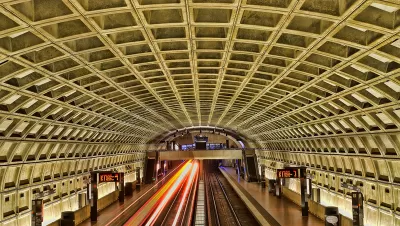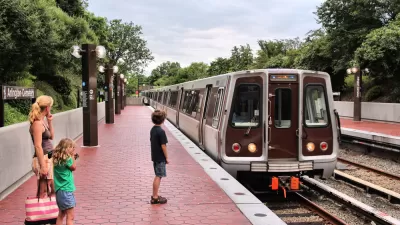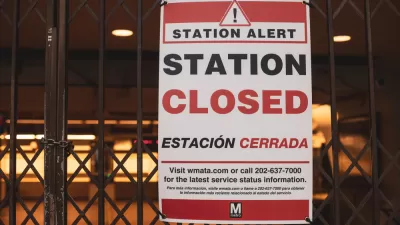The state of Virginia won't let Washington Metro increase services that surpass a three percent subsidy cap implemented this summer.

Max Smith reports on a looming political battle between the state of Virginia and the Washington Metropolitan Area Transit Authority (Metro) over proposed service increases proposed in a draft released in December 2018 and first discussed in October 2018.
The Northern Virginia Transportation Commission recently sent a letter to Metro officials warning them about the potential consequences of implementing the service changes:
"While the Northern Virginia Transportation Commission supports efforts to increase ridership, including cheaper unlimited-ride passes, the letter — due to be approved next month — warns proposals to extend trains to provide more service at stations along the Red, Yellow and Green Lines without significant savings elsewhere would run up against a new legal cap on cost growth.
Supporters of the service increases argue that improvements are necessary to attract riders back to the struggling system.
Regarding more details of the proposed service improvements, Smith explains:
The additional weekday service is one of several potential increases next summer, but Metro estimates it would cost $5.4 million on top of other expenses already accounted for in the budget. Other proposals, if the Metro Board can fund them, include $3.6 million to extend all Yellow Line trains to Greenbelt, $1.2 million to run more Red Line trains past Silver Spring to Glenmont, and $10.1 million to continue moving toward more 8-car trains.
FULL STORY: More Metro trains at your stop could hit roadblock over Va. funding

Study: Maui’s Plan to Convert Vacation Rentals to Long-Term Housing Could Cause Nearly $1 Billion Economic Loss
The plan would reduce visitor accommodation by 25,% resulting in 1,900 jobs lost.

North Texas Transit Leaders Tout Benefits of TOD for Growing Region
At a summit focused on transit-oriented development, policymakers discussed how North Texas’ expanded light rail system can serve as a tool for economic growth.

Using Old Oil and Gas Wells for Green Energy Storage
Penn State researchers have found that repurposing abandoned oil and gas wells for geothermal-assisted compressed-air energy storage can boost efficiency, reduce environmental risks, and support clean energy and job transitions.

From Blight to Benefit: Early Results From California’s Equitable Cleanup Program
The Equitable Community Revitalization Grant (ECRG) program is reshaping brownfield redevelopment by prioritizing projects in low-income and environmental justice communities, emphasizing equity, transparency, and community benefits.

Planting Relief: Tackling Las Vegas Heat One Tree at a Time
Nevada Plants, a Las Vegas-based nonprofit, is combating the city’s extreme urban heat by giving away trees to residents in underserved neighborhoods, promoting shade, sustainability, and community health.

How Madison’s Tree Planting Efforts Are Growing a Healthier Community
Madison’s annual tree planting initiative is enhancing environmental resilience, public health, and community livability by adding 1,400 carefully selected trees citywide, with strong community and institutional support for urban forestry.
Urban Design for Planners 1: Software Tools
This six-course series explores essential urban design concepts using open source software and equips planners with the tools they need to participate fully in the urban design process.
Planning for Universal Design
Learn the tools for implementing Universal Design in planning regulations.
Ascent Environmental
Borough of Carlisle
Institute for Housing and Urban Development Studies (IHS)
City of Grandview
Harvard GSD Executive Education
Toledo-Lucas County Plan Commissions
Salt Lake City
NYU Wagner Graduate School of Public Service





























